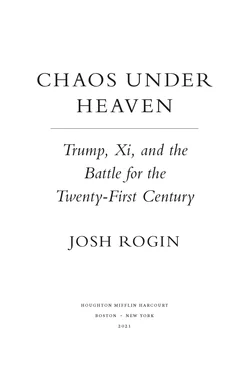When the Chinese government wants a US politician to do its bidding, it typically invests in the relationship early on. The influence operations system of the Chinese Communist Party (CCP) is connected to organizations at the state and local levels all over the country. It’s a numbers game. Some mayors will eventually become governors, or con-gresspeople or senators. Very rarely, the Chinese government finds a willing partner at the top of the food chain. This is what happened with Montana senator Steve Daines.
Daines, a freshman senator, came from the business world and had extensive experience in China. He had worked for Procter & Gamble, living for six years in Hong Kong and China. When he got to Congress, he naturally began using his China connections to advance the cause of opening up that market to Montana beef exports. He took a delegation to China in April 2017 and presented a plastic cooler stuffed with frozen steaks to Chinese premier Li Keqiang in Beijing.
The delegation also visited Tibet and Xinjiang. Tibet at this time was all but off-limits to foreigners. Upon returning, Daines said exactly nothing about his meetings with CCP officials in charge of both of those oppressed provinces—and he said little to nothing about the plight of the Tibetans.
It worked. In September 2017, Daines hosted the Chinese ambassador at a Montana ranch to talk beef exports. Montana ranchers were granted a $200 million beef contract from China.
But then came the phone call. The Chinese ambassador asked Daines to host a meeting with the CCP officials who oversee Tibet, who just happened to be in town on the day before the House Foreign Affairs Committee was set to hold a hearing on Tibet, featuring Lobsang Sangay, the Tibetan president-in-exile. Daines obliged.
Daines and Senator John Barrasso (R-WY) hosted the CCP delegation in Daines’s office and posed for the assembled Chinese media cameras. No US press was invited or notified. The meeting was blasted out by Chinese propaganda outlets. The state-owned China Daily reported that Daines had praised Chinese officials in Tibet for doing “a good job in environmental protection and traditional cultural preservation.”
Did Daines actually say that in the meeting? It didn’t matter. Beijing had gotten their picture and their headlines. The Chinese media coverage of that meeting was meant to muddy any coverage of the real Tibet hearing over on the other side of the Capitol complex. The CCP had put their propaganda in a US senator’s mouth. The damage was done.
The revelation that Daines had been co-opted by the CCP, exposed in a column I wrote on December 17 for the Washington Post, sent shock waves throughout Capitol Hill, but he faced no real consequences. When it was revealed earlier that year that an Australian senator, Sam Dastyari, parroted CCP propaganda while cozying up to a Chinese businessman and donor, the scandal was so big he had to resign. But when I broke the Daines story, his office just denied that anything was wrong with what he had done and Daines told his local newspaper that “Washington columnists” didn’t understand what he was doing for Montana’s ranchers.
Daines did other favors for Beijing. Over the summer of 2017, he worked behind the scenes to block progress of a bill put forward by Senator Ted Cruz that would rename the street outside the Chinese embassy in Washington after Nobel Peace Prize winner Liu Xiaobo, who died in government custody. The Chinese leadership told Rex Tillerson that preventing this bill from becoming law was one of their top three priorities.
Daines’s trading of political favors to Beijing in exchange for economic rewards “confirms everything the Chinese believe about us and folks around the world, that anyone can be bought,” former US ambassador to Burma Derek Mitchell told me. “We’re only as strong as our weakest link, and that Daines would do this only encourages them to continue.”
China’s tactics didn’t always work. Senator David Perdue was a former businessman, like Daines, with experience in China; like Daines, he sometimes did favors on demand for the Chinese embassy. When the Senate Foreign Relations Committee was planning a hearing to mark the anniversary of the Tiananmen Square massacre, the Chinese ambassador reached out to Perdue, who asked to use the committee room to host a meeting with CCP officials. It was another counterprogramming attempt, but this time the Chinese wanted the recognizable committee room to be the backdrop in the photos. To his credit, the chairman, Senator James Risch, said no way.
Friends in Low Places
The CCP doesn’t just focus on the politicians; they cultivate relationships with congressional staffers of all levels. The main way this is done is by bringing staffers on lavish trips to China, something the China-United States Exchange Foundation is heavily involved in. The trips are run by a variety of organizations that are more or less connected to the government, with government or CCP-linked money all around. This is legal but a severe abuse of the spirit and intention of the Mutual Educational and Cultural Exchange Act (MECEA), a law that allows the State Department to approve trips for federal employees being sponsored by foreign governments.
When MECEA was passed in 1961, the idea was to foster goodwill, not open the door to a huge influence operation sponsored by an adversary government. In recent years, the number of MECEA China trips has outstripped by far the total for all other countries combined. Almost any level congressional staffer could apply, from staff assistant to press secretary. Many staffers traveled to China over and over again. It amounted to millions of dollars of free gifts. “There are chiefs of staff that go once or twice a year for several years,” a senior GOP senate aide said. “The CCP has spent so much money taking people to China over the years. Then they call up all the friends and all of the people who have gone on those trips later and ask for favors.”
There were a variety of favors that the Chinese government would call in from their former five-star travel guests. In yet another example of counterprogramming, the Chinese embassy once asked a congressional office chief of staff who had been on a free trip to help it host a photo exhibit in the halls of a congressional office building near a human rights hearing. Another congressional staffer—a Senate press secretary—who went on a MECEA trip to China told me that her handlers took her to a Uyghur village, where “reformed” Uyghurs who had been in the internment camps told her they loved Xi Jinping—as the CCP minders watched on.
“The point is to get visibility up from the staff assistants all the way to the chief of staff,” the GOP official said. “It’s just the sheer scope and scale of what they are doing. Everyone knows that it’s a problem, and nobody wants to admit it.”
Draining the Swamp
Capitol Hill is a land of many tribes. Inside the parties, and sometimes across them, members join forces for a variety of reasons. On China, there have always been passionate camps, but they have largely operated in their own lanes. You have the human rights champions, the defense hawks, the trade skeptics, the finance and business crowd. But as the China issue began to heat up, these camps all joined the fight. The first big battle was over whether to let national security or business decide where and when China could invest in the United States.
When Congress debated granting China permanent normal trade relations in 1999 and endorsing China’s WTO accession in 2001, pro-business engagement folks lined up on one side and all the other amalgamated tribes opposed them on the other side. The business folks won out. But twenty years later, when it was time to reform the law that governs how Chinese investment and national security interact, the dynamic had changed.
Читать дальше











